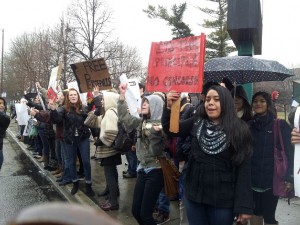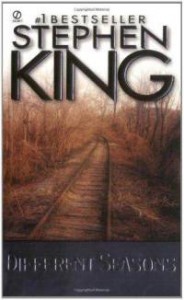Lately, most of the books being attacked by censors are meant for young adult audiences. Many adults argue that the books meant for teens facilitate unsavory behaviors — teenage drinking, underage sex, and more. But teens have proven to be key players in protests against book bans.
Persepolis by Marjane Satrapi

Students, teachers, and parents protest the Persepolis ban outside Lane Tech College Prep (source: Banned Books Week)
Almost simultaneous with a blog post that shared Chicago Public Schools’ attempt to ban Marjane Satrapi’s Persepolis, students in the CPS system used social media to organize visible and vocal protest against the ban. Within hours of a blog post announcing the ban, students lined the streets outside Lane Tech College Prep to oppose the proposed removal of the book from classrooms and libraries in the school system.
Maren Williams covered the story for CBLDF, writing about teens’ opinions on the ban:
…Chicago history teacher Dave Stieber recounts how he took Day’s advice and assigned his 71 TEAM Englewood Community Academy students to read Persepolis. Stieber then asked them to think about why the district might want to suppress the book and whether the ban was justified. Fifty-three students thought the book should not have been removed from classrooms, while most of the remaining 18 said the question of whether or not the book is used in classrooms it should be left up to teachers, who know what their students can handle.
Stieber’s post includes some direct quotes from his pupils, who display the type of critical thinking and insight that CPS presumably would like to cultivate in its students. First, a few of them point out the irony of trying to shield Chicago students, 20-30% of whom have witnessed at least one shooting, from literary violence. One student named Renika sums up the sad state of affairs for youngsters in her city: “Persepolis is not inappropriate, it may have violence, but violence is in the everyday life of a seventh grader.” Her classmate Latoria agreed, saying that “[t]he truth of the book is not much different than what kids see in their neighborhoods every day.”
As a result of the furor, CPS rescinded the ban of Persepolis, but the book was still removed from Grade 7 classrooms.
The Perks of Being a Wallflower by Stephen Chbosky
In the August 2013 edition of The Illinois Library Association Reporter, Kids’ Right To Read Project head Acacia O’Connor examined how youth voices contributed to the defense of The Perks of Being a Wallflower in Glen Ellyn, Illinois, where a school board initially decided to remove the book from classrooms despite a review committee’s recommendation otherwise. When the school board reviewed the decision, students were among the first in line to fight the removal:
Over the course of the debate, half a dozen Hadley eight-graders signed up to speak at school board meeting. They told the board that The Perks of Being a Wallflower, far from harming them, had helped them deal with their own feelings of depression, struggling to belong, or being alone.
An essential component to the defense of Perks was a You Tube video made by Maddie Griffin and Maddie Howard, students in the Glen Ellyn system. Maddie and Maddie didn’t like the idea that adults thought they didn’t and shouldn’t have a voice in the decision, so they made an impassioned plea for Perks, a plea that gained attention on the national stage, with links on media outlets such as Huffington Post.
The protest gained the interest of renown author Judy Blume, herself no stranger to censorship, and her support also lent credence to the acclaimed novel, leading to the overturn of the ban.
Different Seasons by Stephen King
 A decision by the Rocklin, California, Unified School District was proof that a single dissenting voice can help keep books on library shelves. A district-wide review committee decided to keep Stephen King’s collection of novellas, Different Seasons on high school library shelves. CBLDF joined the Kids Right to Read Project to defend the novel in a letter addressed to the school district.
A decision by the Rocklin, California, Unified School District was proof that a single dissenting voice can help keep books on library shelves. A district-wide review committee decided to keep Stephen King’s collection of novellas, Different Seasons on high school library shelves. CBLDF joined the Kids Right to Read Project to defend the novel in a letter addressed to the school district.
Rocklin senior Amanda Wong was the sole student on the original committee that reviewed the novel after it was challenged for a rape scene in the novella “Apt Pupil.” She was also the sole dissenter in the initial decision to remove the book from library shelves throughout the district. She took her concerns over the censorship of the book to the school district, and her adamant defense of the title led Rocklin Unified Superintendent Kevin Brown to supersede the decision of the first review committee. Brown ruled that the the committee, which was comprised only of members representing Rocklin High School, could not make a decision for the entire district. He assembled a committee of representatives from throughout the district, and the second committee supported the unrestricted retention of the title on high school library shelves.
Often, adults discount just how sophisticated teens can be in selecting reading material. Most teens recognize their own limits and are willing to voice their concerns about the content of a book. While adult intentions might be noble, restricting access to materials does more harm than good. Allowing one vocal adult opponent (or a small group of opponents) to determine what is right for all students is not only unconstitutional — it violates both the rights of teens to make decisions about what they read and the rights of parents to determine what is best for their own children. Fortunately, teens are some of the most outspoken advocates for the freedom to read, and their efforts have helped prevent censorship.
CBLDF is a sponsor of Banned Books Week. Please help support CBLDF’s important First Amendment work by making a donation or becoming a member of the CBLDF!